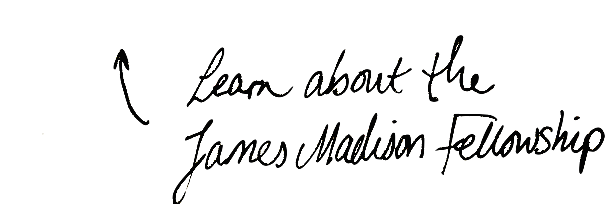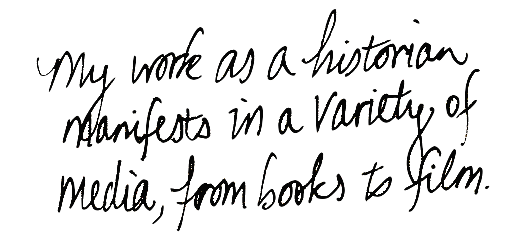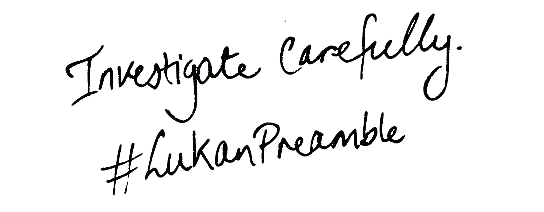It has been quite awhile since I made a blog post categorized under the “Journal” label. In an effort to be professional and not fill the blogosphere with personalized, sentimental clutter that once characterized the silly blog posts of my teen years, I effectively ceased blogging about daily life or casual commentary and stuck with partially cross-posting my polished articles that were published at various outlets.
Since getting site hits on my column at the Communities at The Washington Times website is part of the job, I need to shift my strategy somewhat. From now on, I plan to reference my recent articles in individual posts here and only cross-post for my personal website archives after the article has been out for awhile (you can also see my latest columns headlined on this website’s sidebar). Furthermore, I plan to do follow-up blog posts responding to thoughtful commenters when necessary.
NOTE: Scroll down to see a “Subscribe to my e-newsletter!” form on the sidebar – it’s a new project of mine that I hope readers will enjoy. Subscribe if you’re interested! UPDATE: If the form doesn’t show up in your browser, just send an e-mail to amanda@amandaread.com with “Subscribe” in the subject line until I get this straightened out.
That being said, here are links to my recent TWTC articles:

Saturday, July 9, 2011 – Facebook blocks video of Ann Coulter interview as “abusive”
Cry-wolf syndrome kicking in: If you waste accusations of “abusive” and “racist” and “violation of separation of church and state” on material that really isn’t such, you risk making society indifferent to real dangers.

Saturday, July 16, 2011 – Of sexism and atheism: Richard Dawkins gets in trouble with feminists
A feminist atheist notices sexism in the skeptic community, and Dawkins scoffs. Does the professor have a point? Does atheism offer a solution to sexism?
Needless to say, the latter stirred up quite a bit of debate.
I was pleased to see that dissenting commenters (for the most part) bothered to be polite and above-board this time (at least to my knowledge – I don’t know if the editors had to censor any garbage out this time or not). I also was glad to see a greater occurrence of original thought. Oftentimes in these comment wars, I see a lot of what I call “copy and paste thinking”, in which people almost mindlessly regurgitate the same old arguments their buddies post on message boards all over the internet. Some triteness did show through from time to time, but as a whole there was a train of thoughtfulness.
I’ll briefly respond to a few arguments that caught my eye:
- “I don’t understand, why is what happened in the elevator sexist in any way?” -GoMadden
- “Christian feminists are jumping on elevatorgate…” -Rev. Aaron O’Donahue of the “Church of Atheism”, while linking to my article.
- “That’s sexist as heck. Your assumptions are firmly rooted in 1850. The year, not the test score. Appropriate business behavior does not depend on a business card.” -Peeweeherman, regarding my statement that a man should know better than to do more than “exchange business cards” with a woman in an elevator.
First let me admit that I do not consider myself to be a “Christian feminist”. I don’t consider myself to be a feminist at all. I know there are plenty of conservative Christian women who claim to be feminists in the sense of classical, suffragette feminism, but I prefer not to bother with the term “feminist” anyway. Like Michele Bachmann says, I’m “pro-woman and pro-man”, not a believer in cheap, whiny, politically expedient victimization of women.
Secondly, I must explain that I do not endorse Rebecca Watson’s conclusions about the man in the elevator. I understand that what the guy did was not very appropriate, but I’m not convinced that it was rooted in genuine sexism. My “business card” phrase was meant to illustrate that in a late night/early morning elevator excursion, it would really be more appropriate for a stranger man interested in a lady to exchange contact information rather than invite her to his hotel room. (I could have said “exchange calling cards,” but that would have sounded even more 1850-ish.)
I thought that Watson’s observations of verbal abuse of women in new media audiences was more enlightening than the story of the elevator man.
I do think that it is, in a way, “sexist” for women to assume that every man who strikes up a conversation with them is a dirty sex pest with no self-control. The same could be said for those who assume men are so hopelessly carnal minded that every woman needs to be draped in potato sacks to keep males from lusting after them.
The man who claims to be Rev. Aaron O’Donahue of the “Church of Atheism” made an excellent point on Facebook when he said that he was tired of people abusing terms such as “misogynist” and “racist”. Yes, people need to stop crying wolf about sexism and racism when it doesn’t really exist – just as skeptics should not cry wolf about separation of church and state being violated when it really isn’t. False alarms are not healthy for society.
That being said, whether or not what happened in the Dublin elevator was sexist is beside the point of my article. I didn’t fully agree or disagree with the arguments made by both Watson and Dawkins. I merely intended to say that atheism can’t offer a solution to sexism against women, because if it’s simply about making women feel more empowered, it is a relativistic issue that can never be settled.
The Christian worldview asserts that men and women are equal bearers of Christ’s image, and that sexuality is a sacred thing intended for the covenantal union of one man and one woman. The Bible is filled with vivid scandals recorded “for our instruction” (Romans 15:4) that describe what kind of havoc is wreaked when the Creator’s initial design is disregarded and men and women are disrespected.
Apparently medical science doesn’t contradict this principled perspective.
- “Amanda Read is attempting to understand atheism from her worldview, so she makes the mistake of assuming that atheists are atheists because of some philosophical reasoning.” -Sam
- “In Haiti, 96% of the population in Christian.” -ShanaD
- “Evolution is just about how we evolved. Morality is something completely different and is not dependent on a belief in either creationism by God. Genetics may determine drives, it does not determine behavior. Cultural conditioning is what determines our behavior and morality. In fact, evolutionists claim that morality is actually a huge advantage for social creatures like humans.” – ShanaD
- “Rape rates are higher in more religious states, typically, than in more secularized states.” -ShanaD
- “Secularism didn’t exist when Jesus Christ was on earth, before he was on earth or for more than a millennium afterward.” -The Great and Powerful Oz
Sam, I actually was not assuming that atheists become atheist because of some philosophical reasoning. How or why people become atheist or secularist had nothing to do with my article. I simply argued that atheism is inadequate for solving moral problems. I assume most atheists would agree, since they usually argue that atheism is not a belief system. Thus, they are left trying to find morality from other sources.
ShanaD, as the CIA World Factbook notes, roughly half the population of Haiti practices voodoo, a decidedly un-Christian activity. Witchcraft is strongly prohibited in Scripture because practicing it – along with other sins – gives the spiritual enemy legal right to harm you.
I haven’t yet studied rape rates in religious vs. secularized states, but that is still beside the point of my argument. In my article I argued that religion (and there are many false ones) as an institutionalized human activity alone is also inadequate. A person can go through superficial religious motions and have a wicked heart. That’s why Jesus Christ was so harsh towards the religious elite of His day.
As for evolution and morality, earlier this year a political science professor of mine handed out an article which noted that the challenge scientists face in trying to understand the origin of morality is that humans generally treat morality not as a means to an end, but as an end itself: http://www.nytimes.com/2009/04/07/opinion/07Brooks.html
It’s an interesting puzzle to ponder.
The Great and Powerful Oz, there is probably confusion regarding my use of the word “secularism”. Last month I authored an article on the Weinergate scandal in which I explained this:
Why would any of these women – and Weiner himself – and his constituents, come to think of it – treat this (originally private) immorality as something irrelevant to the rest of society?
Evidently in a secularized society, nothing is considered sacred anymore.
I’m not talking about “secular” as in the constitutional distinction between the governing traditions of church and state. Rather, I’m referring to secularized as in the opposite of sacred – and it is an age old conflict, not a phenomenon unique to the 21st century (although for the first time in history we have online networks that offer “open relationship” as a social status).
The very root word of secular has to do with that which is fleeting, temporal, and inconstant (“You only go around once in life, so you have to grab all the gusto you can get…”).
If there is not some sense of sacredness acknowledged despite the secular, there will be no stability or permanence to any institution.
This is why President George Washington was accurate (and utterly constitutional) when he said in his farewell address,
“Let it simply be asked, Where is the security for property, for reputation, for life, if the sense of religious obligation desert the oaths which are the instruments of investigation in courts of justice?”
In the plainest sense, within my sexism/atheism article I referred to the Roman officers as “secular authorities” in Jesus’ day – meaning, of course, that they were categorically different from the Jewish religious authorities. In another sense, I tend to use the term “secularized” to refer to a worldview that desecrates moral standards of the Word – and that, of course, can refer to far more beliefs than atheism.
Meanwhile, in my corner of the world…
I just completed Term V at Troy University, which for me consisted of Finite Mathematics, Biology and Visual Art (all typical required classes, but all of which I enjoyed – click here to see a portrait of my sister that I painted for the art class). I now have a 3-week break before the next term starts (I’m a junior).
Studying biology renewed my interest in genetics, so my siblings and I have attempted to experiment with breeding our Transylvania Naked Necked/Silkie cross chickens a neighbor gave to us earlier this year (providing the broody hen we selected will cooperate). An article in The Economist mentioned that the naked neck trait is controlled by the activity of a gene which encodes the protein BMP12. A poultry genetics resource says that the trait is incompletely dominant and carried on the third chromosome.
I’m curious to see if any of the offspring will display the Chinese Silkie feathering that our neighbor implied the Turkens are heterozygous for (most of them display the five-toe trait and dark skin common in Silkies, which supports that claim). In the long run, our focus for chicken raising is encouraging good quality brown eggs (the Turkens lay well, but they don’t have particularly large eggs). We’ve added some Black Australorps and Black Giants to our flock of Dominique hens for more egg production.
We have been enjoying a tremendous garden here at Fair Hills Farm – we eat tomatoes, cucumbers and green beans with nearly every meal. My mother and Abigail (14 yr. old sister) tested a recipe for salsa, which turned out delicious. The homemade pickles are great too.
I need to finish transcribing an upcoming interview…so, that’s all for now.
~ Amanda ~
















fantastic article. I are unable to think it will be the 10 yr September 11 anniversary by now. I do not care just what the media says, it is really somewhat obvious it had been a bogus flag attack from the United states of america authorities. Osama Obama ended up being the particular funded puppet. All kinds of things the U.S. federal government states as reality is complete spam. Period many of us hope for our missing colleagues and relatives.